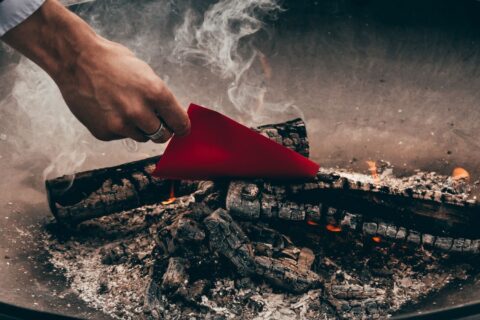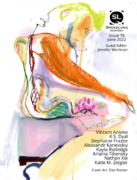My fire pit glows in the darkening backyard, corn cobs–Kayode’s favorite–roasting atop the coals. Fresh off the airport taxi, he slides past the rear gates. I help him prop his luggage against a wall and throw myself into his arms–to remember his scent. The pinewood on his corduroy evokes no memory. His hug fails to bruise my spine. And when he says I missed you, Mom, it sounds rehearsed, his accent diluted.
We sit on white plastic chairs flanking the flames, and I feel the distance of the last three years more thoroughly now–our perfunctory half-hour Sunday afternoon calls, his one-word replies to my paragraphs of texts. I worry that this two-week summer visit will not fix us. But when I mention that the neighbor’s wife finally snapped and broke a bottle on her husband’s head, when Kayode gasps and then laughs and says about time, when he unwraps a cob and bites into it and licks the butter off his lips, when he tells me about the Fulani businessman that caused a scene on his flight just before takeoff, I become younger, time’s separating ocean almost a droplet. Almost.
What changed, I ask. Why did we grow apart? Why did you stop trying?
Our first cobs are naked rinds at our feet. Kayode fidgets and looks away. I place my hand on his shoulder, which makes him turn, makes him speak, even though he cannot meet my eyes.
I like men, he says.
My palm retreats to my lap.
Even before leaving, he says, I always had this feeling deep inside.
I start on the next cob, eating just to keep busy, to drown the falling in my stomach, my mind’s looping roar of you failed him. He could never say it, he says, because he knew I loathed his kind–like his friends did, our priests, the government, every force in his life. He says it took him all these years at Columbia to finally accept himself.
I’m only telling you because I miss you, he says. We used to be friends.
I’ve heard the stories. The neighbors’ tongues still carry the name of Madam Nkiru’s son, even though he died twenty years ago. How his vomit-soaked body had been discovered in Maryland on graduation’s eve, a bloody needle in his arm. Then there was the hairdresser’s teenage daughter turned pregnant by some white Canadian old enough to grandfather her. The night before Kayode left Nigeria, I tossed in bed, reminding myself that he’d be fine. I’d taught him in gentle bedside lullabies–your body is the Holy Spirit’s temple. I’d ensured the fullness of his spiritual diet with twice-daily prayers, Gwagwalada bible camps, choir practice at St. Mary’s. I’d done everything to ensure his soul would make Heaven, even if mine didn’t.
I tried to be with women—he’s still talking—my freshman year at Columbia. But they felt all wrong–their lips, their breasts, their night breath on my neck. It was so different my first time with a man.
A man. He says it so casually. I rise, my chair scraping against gravel, and look up at the crescent moon. Except I don’t see the moon, don’t see the stars; I see a gray-haired white man–maybe Kayode’s Bio professor, who teaches a new and Westernized Bio, who says that it is okay, it is how bodies move in these lands. I see the white man’s tongue sucking Kayode’s, the white man’s trousers falling, the white man’s penis hairy, red with bumps, that penis entering Kayode’s anus. I squeeze my hand into a fist, the fist into my mouth. I bite hard but cannot draw blood.
I’m still your son, Kayode says in that hybridized accent, your into ya. He closes the gap between us, takes my hand with his greasy and quivering palm. The next house over, a gate creaks, and I know the bottle-wounded husband has returned from his barbershop; he always returns. I imagine low whispers over supper; in these lands, a mother’s deepest failures never stay buried–her son is back, yes, the New Yorker doctor-wannabe, about to graduate, him, guess what he’s become. A tale for the ages. I listen to what he’s saying now, my Americanah son: I hadda tell ya before I went back, back to Columbia, I hadda, I just hadda, because I’m still ya son. Right there, within his twisted syllables, I see the answer.
Can I get a paper towel, I ask, my fingers dabbing at my eyes. He nods eagerly, ready to grant me the universe. He disappears inside the house. His home. First time in three years. I steady myself and square my shoulders to resist the heavy weight of the months ahead. I am capable. I always have been.
There is a lack of rhythm to his pattering feet; I know that he is reorienting himself with the location of things, the cupboards, the pots, the windows. A spark from the pit catches my shadow as I turn toward the rear gates. Beyond this life, a congregation of sparks will consume the sinner forever. But here, now, the heat is salvation. I reach atop Kayode’s wall-propped luggage for the file from which his flight ticket peeks out. His Nigerian passport with the US Visa too. I say a silent prayer and toss Kayode’s file into the bright-burning flames. As the pages shrivel and blacken, I learn to breathe again.



 The core workshop of SmokeLong Fitness is all in writing, so you can take part from anywhere at anytime. We are excited about creating a supportive, consistent and structured environment for flash writers to work on their craft in a community. We are thrilled and proud to say that our workshop participants have won, placed, or been listed in every major flash competition. Community works.
The core workshop of SmokeLong Fitness is all in writing, so you can take part from anywhere at anytime. We are excited about creating a supportive, consistent and structured environment for flash writers to work on their craft in a community. We are thrilled and proud to say that our workshop participants have won, placed, or been listed in every major flash competition. Community works.